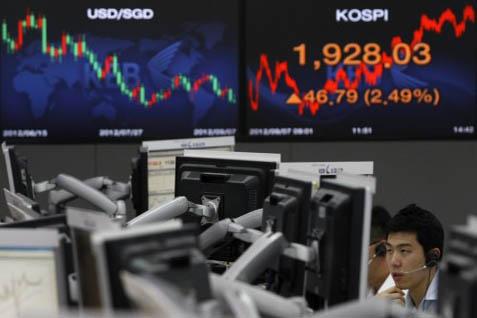South Korea Quietly Intervenes on The Won to Bolster Economy
Some dealers estimated the authorities' net dollar buying at around $12 billion in May.

Some dealers estimated the authorities' net dollar buying at around $12 billion in May.
Bareksa.com - South Korea's foreign exchange authorities have been engaged in a quiet war in recent months to hold down the won, throwing more firepower at it than for years in a bid to support exports and help keep the economy on its fragile recovery track.
The dollar-buying accelerated as the won hit six-year highs and crept towards 1,000 to the dollar, a psychologically symbolic level that policymakers appear reluctant to see broken quickly. It stood at around 1,019 per dollar late on Friday.
The authorities have said they intervene only to smooth volatility, blaming "herd" behaviour for pushing up the won.
Promo Terbaru di Bareksa
Yet for now, even though the government wants to rebalance the economy towards consumption and away from exports, growth still relies on trade and a strong won hurts, hence the stepped-up intervention.
Some dealers estimated the authorities' net dollar buying at around $12 billion in May. HSBC economist Ronald Man said in a report on Thursday that intervention that month may have been the largest since November 2009.
While President Park Geun-hye has been keen to stimulate domestic consumption, demand has been crimped by the April ferry accident that killed more than 300 passengers. That darkened the public mood and hurt activity in a number of sectors, including retail and travel.
Exports, meanwhile, have suffered from slow growth in China, South Korea's biggest market.
On Thursday the Bank of Korea cut its economic growth forecast for this year to 3.8 percent from 4 percent.
Despite a stance in favour of free markets, South Korean authorities have long intervened in currency markets, which has caused friction with the United States and the International Monetary Fund.
"The government has no choice but to support exports as there is a limit to what it can do to boost domestic consumption," said Jeon Seung-ji, a foreign exchange analyst at Samsung Futures.
Even if a stronger won brings down import prices, household incomes aren't rising much, so neither will spending, she said.
"The authorities are caught in a situation where they just can't sit and watch the won strengthen."
South Korea's long positions in foreign currency forwards against the won stood at $54.647 billion in May, IMF data released on June 26 showed, the highest in three years. That indicates the authorities bought spot dollars and later swapped them, which prevents dollar-buying intervention from showing up in headline foreign reserves data.
IMF data on the country's aggregate long positions in forwards in foreign currencies has shown the positions rise in line with the won's acceleration, as the authorities try to hold the currency back.
South Korean authorities disputed the IMF's methodology during its consultation last year with the agency.
"The IMF estimates with their own means and calculations but this is a very dangerous thing. Publishing that kind of information can bring confusion upon many people," said an official at the Bank of Korea, declining to be identified given the sensitivity of the matter.
LEAVE IT TO THE MARKET
The IMF advised against excessive intervention in its annual staff report on the country's economic developments and policies released in April.
It also said movements in the won should continue to be determined by the market and that South Korea's reserves were already adequate.
The issue is a sensitive one because the authorities are wary of speculators betting against the government.
"We can't say all of the increases in the forwards data come from intervention, but they definitely are linked to it," said Lee Dae-ho, a foreign exchange analyst at Hyundai Futures.
However, dealers at multiple banks in Seoul have told Reuters there has been a surge in intervention in recent weeks.
The won has not strengthened above 1,000 since mid-2008, before the global financial crisis, coming closest at 1,008.4 on July 4.
The implications of a stronger currency were evident last week when Samsung Electronics Co Ltd, the country's biggest company, pointed to it as a major factor when it gave weaker-than-expected earnings guidance.
If upward pressure persists, intervention is unlikely to ease under the leadership of the incoming finance minister, Choi Kyung-hwan, who told lawmakers last week that domestic economic conditions were "dire" and that he would do his utmost to stabilise markets.
The won weakened as investors feared further intervention.
"After Choi takes office, the most important thing that will be watched by markets will be the speed of the intervention," according to one foreign exchange dealer at a bank in Seoul.
"They will keep trying to regulate the pace and lessen fluctuations as the won nears 1,000." (Source : Reuters)
Pilihan Investasi di Bareksa
Klik produk untuk lihat lebih detail.
| Produk Eksklusif | Harga/Unit | 1 Bulan | 6 Bulan | YTD | 1 Tahun | 3 Tahun | 5 Tahun |
|---|---|---|---|---|---|---|---|
Trimegah Dana Tetap Syariah Kelas A | 1.385,6 | ||||||
Trimegah Dana Obligasi Nusantara | 1.095,56 | - | |||||
STAR Stable Amanah Sukuk autodebet | 1.084,98 | - | - | ||||
Capital Fixed Income Fund autodebet | 1.853,59 | ||||||
Insight Renewable Energy Fund | 2.287,69 |

Produk Belum Tersedia
Ayo daftar Bareksa SBN sekarang untuk bertransaksi ketika periode pembelian dibuka.

Produk Belum Tersedia
Ayo daftar Bareksa SBN sekarang untuk bertransaksi ketika periode pembelian dibuka.